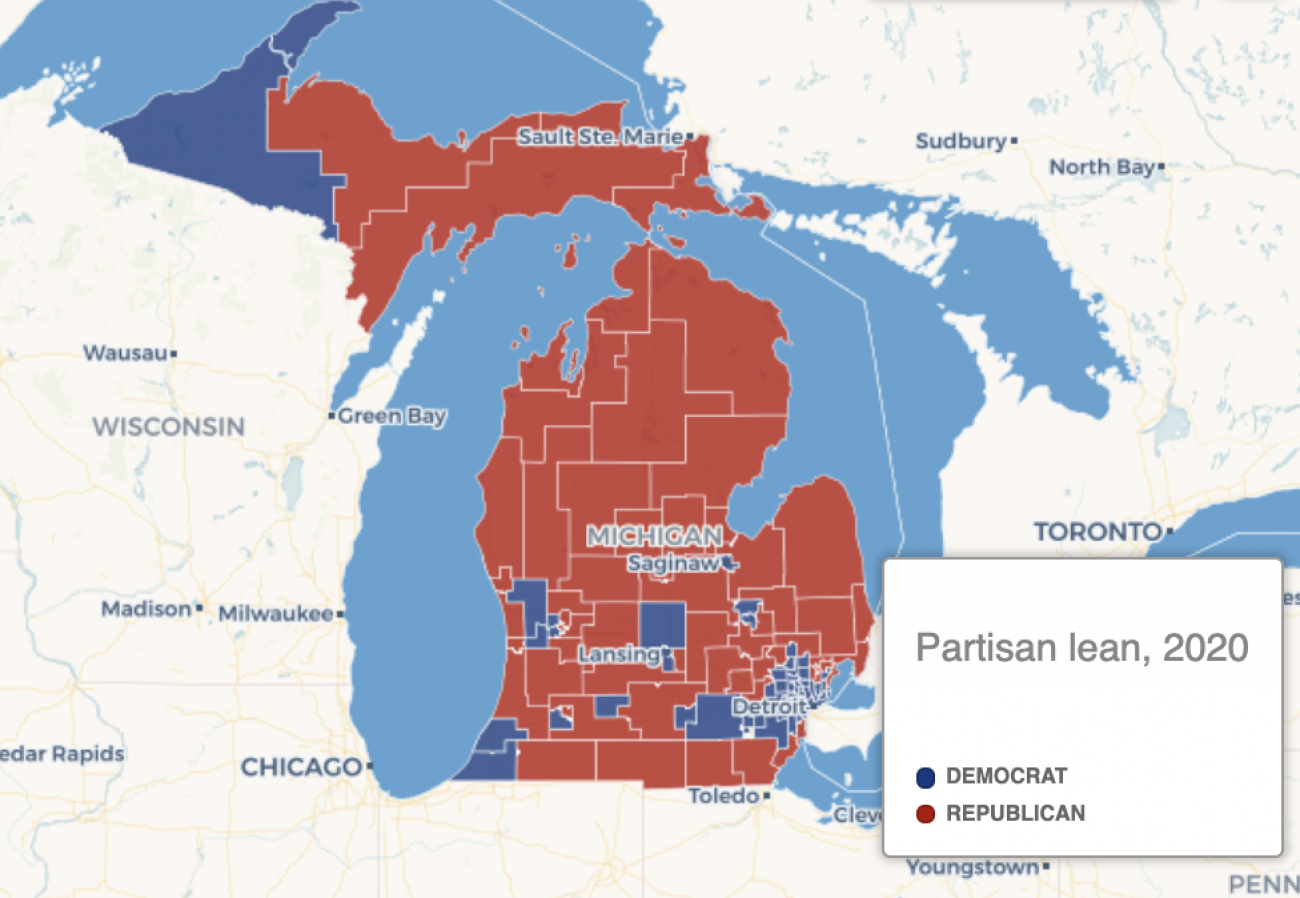Michigan redistricting panel getting closer on maps; they still favor GOP

Oct. 15: Michigan redistricting panel’s maps spark racial backlash, fairness questions
Oct. 11: Michigan redistricting drafts could make state Senate a toss-up
Oct. 11: Michigan congressional redistricting drafts are done. Few incumbents are safe
Oct. 11: Republicans have edge, but Michigan House drafts include plenty of surprises
LANSING— The Michigan Independent Citizens Redistricting Commission is closer to finalizing new congressional and legislative draft maps, and an analysis shows state districts so far still strongly favor Republicans.
On Friday, the commission, with the help of its partisan fairness consultant Lisa Handley, evaluated the draft congressional, House and Senate maps using vote breakdowns from the last 13 elections.
The proposed congressional maps, which are drawn to reflect Michigan’s loss of one seat next year because of stagnant population in the 2020 Census, would give Democrats an edge in seven of 13 districts.
Related:
Proposed Michigan congressional map
A preliminary congressional map drafted this week looks to fairly split voters in the state. The state delegation is now evenly split 7-7 but the state is losing a seat. Using the 2020 presidential race as a guide, the districts may give a 7-6 edge to the GOP, with two seats being toss-ups. A more detailed commission analysis shows the Democrats would have a 7-6 edge. Tw
Source: Bridge Michigan analysis of maps provided by the Michigan Independent Citizens Redistricting Commission
House and Senate map drafts give Republicans a significant advantage. In one scenario, Democrats could collect 52.3 percent of all statewide votes in Senate races, but only win 18 of 38 seats.
Multiple proposed maps in the state House would provide an even larger edge toward Republican candidates.
The analysis on Friday confirmed recent reporting by Bridge Michigan that showed the districts strongly favored Republicans.
The 13-member commission evaluated drafts using several metrics, including the so-called “efficiency gap,” which tries to quantify how many districts are “packed” with one party’s voters.
Doing so allows one party to win by big margins in a few districts, while diluting their voters’ power in other districts. In Michigan, that has meant that more Democratic votes are "wasted."
Some experts have said the commission should try to have an efficiency gap of zero, which would mean Democrats and Republicans are evenly favored. Some of the proposed state districts have gaps as high as 12 percent, giving a huge advantage to the GOP.
Proposed Michigan House maps
A preliminary map drafted t create new state House districts in which Republicans would have an advantage in 58 of the 110 districts, based on 2020 presidential election results. Using 2016 results, when former President Donald Trump won, the new map skews even more heavily Republican, with 66 of the districts won by Trump.
Source: Bridge Michigan analysis of maps provided by the Michigan Independent Citizens Redistricting Commission
Handley, the consultant, praised the 13-member commission for its proposed congressional maps, saying “a political scientist would be impressed.”
But Julianne Pastula, the commission’s general counsel, said the commission needs to fix the state maps to make them more balanced.
Commissioners plan to analyze them again next week, before voting on them the week of Oct. 11.
Corwin Smidt, the interim chair of the department of political science at Michigan State University, told Bridge Michigan Friday the commission needs to look at other factors besides the efficiency gap.
“You can have a very accurate map, and have and have a bad efficiency gap score, and you can have a very gerrymandered map, and have a zero efficiency gap score,” Smidt said. “You have to take multiple measures into account, because they're not all smoking guns.”
The commission was created in 2018 after voters overwhelmingly supported a constitutional amendment that dramatically changed how political districts are drawn every 10 years in Michigan.
For years, the party in power in the Michigan Legislature was in charge of drawing the political boundaries, and that led to some of the most lopsided districts in the country, benefiting the Republican Party.
Proposed state Senate maps
Michigan’s nonpartisan redistricting committee has created a proposed set of Senate boundaries that would allow the GOP to keep its edge. Use the map to see how each new district voted in the 2016 and 2020 presidential elections.
Source: Bridge Michigan analysis of maps provided by the Michigan Independent Citizens Redistricting Commission
But the drafts from the independent group have led to concern from Democrats, whose state party chair, Lavorna Barnes, called on the commission not to “repeat the mistakes of decades past.”
“Fair maps require district lines to be drawn so that one party doesn’t disproportionately benefit either political party,” Barnes said in a statement on Wednesday.
After the district drafts are approved, the commission plans to collect public comment throughout the state before voting to approve them by Dec. 30. The timetable has changed repeatedly.
Members had planned to have at least nine hearings, starting on Oct. 18, but on Thursday voted to reduce the number to five because of timing concerns.
On Thursday and Friday, commissioners also voted to also shrink the time allotted for individual public comment during its meetings to 1 minute from 2 minutes.
This is in response to an increase in the number of public commenters. During the last few meetings, public comment has lasted about two hours.
Eric Ventimiglia, the executive director of the conservative advocacy group Michigan Rising Action, criticized the decision.
“It’s one more in a long line of examples of this commission changing the rules and the plans at the last minute, which is the opposite of transparency and owed to their inability to do anything efficiently,” Ventimiglia told Bridge Michigan in an email Thursday.
See what new members are saying about why they donated to Bridge Michigan:
- “In order for this information to be accurate and unbiased it must be underwritten by its readers, not by special interests.” - Larry S.
- “Not many other media sources report on the topics Bridge does.” - Susan B.
- “Your journalism is outstanding and rare these days.” - Mark S.
If you want to ensure the future of nonpartisan, nonprofit Michigan journalism, please become a member today. You, too, will be asked why you donated and maybe we'll feature your quote next time!




